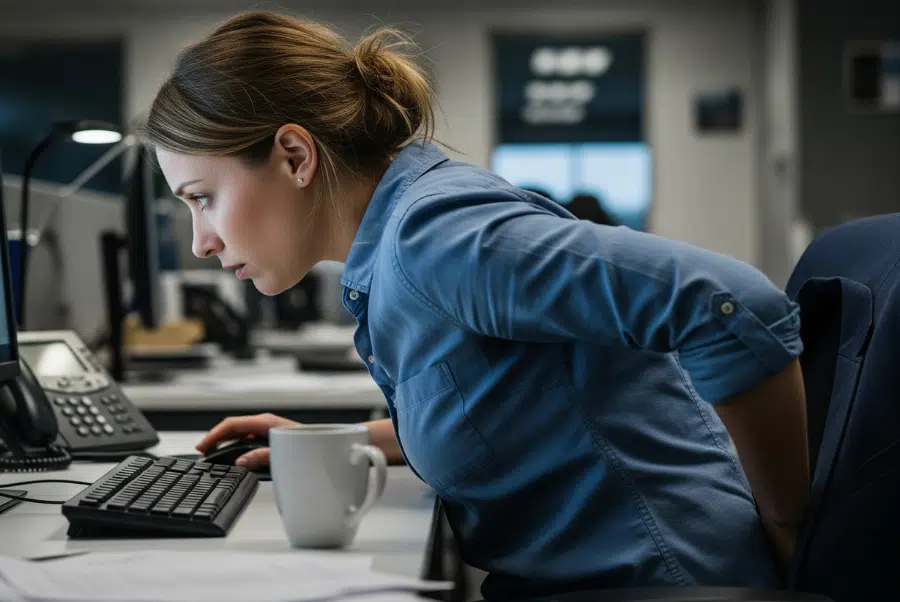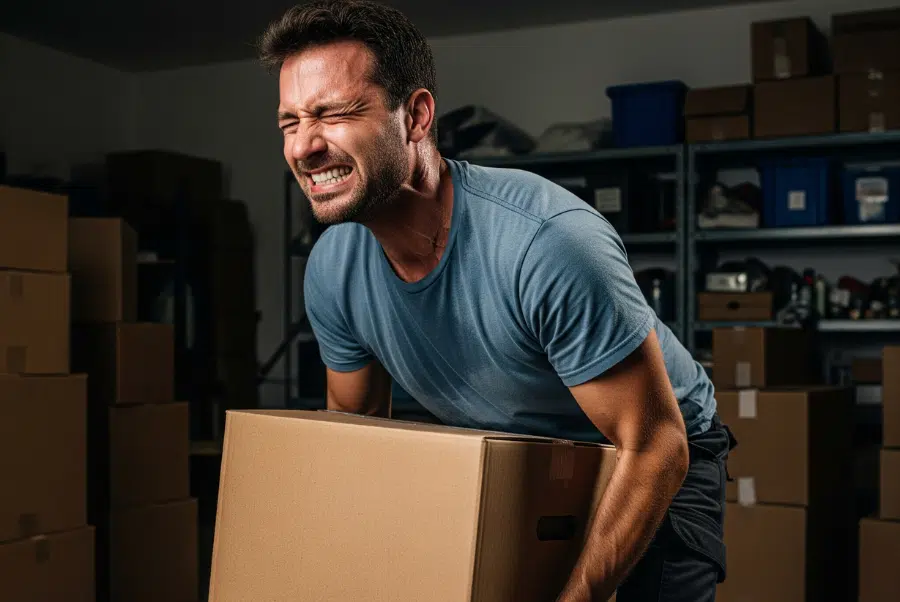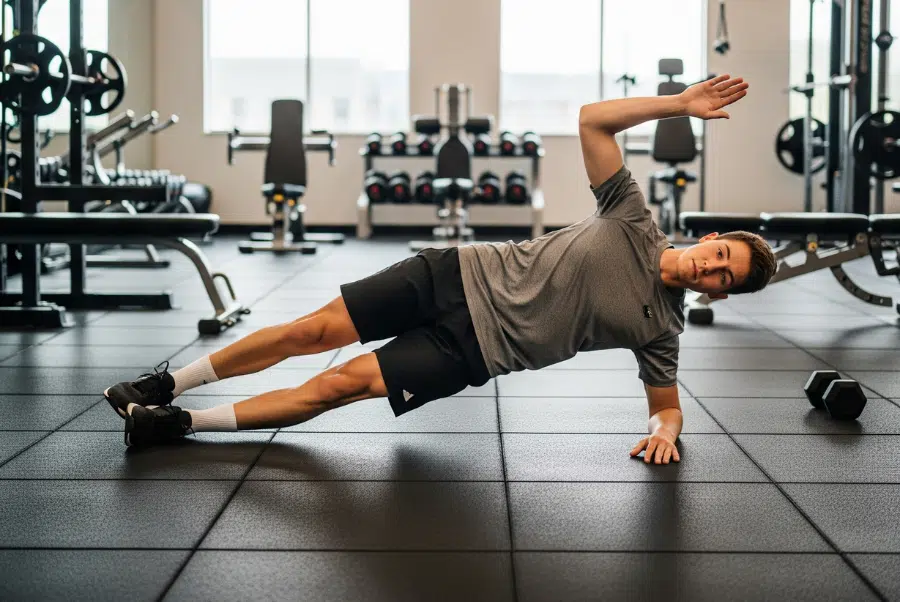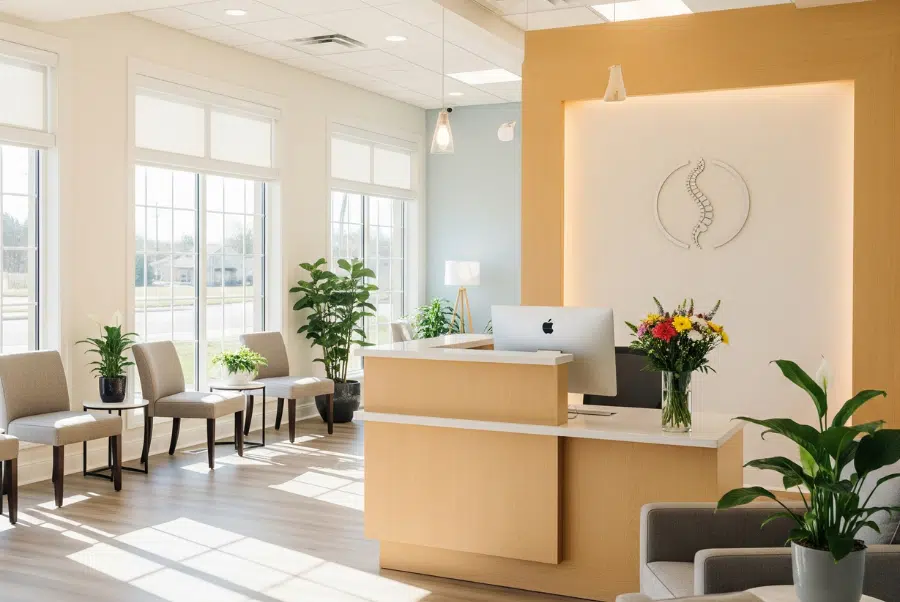Ever wonder why some people wake up one day and—boom—their back is wrecked?
No sports injury. No crazy accident. You didn’t try to move a whole fridge by yourself. And yet… it feels like your spine is screaming at you.
Here’s the thing: in Yorktown VA, it’s often not the “big events” that mess up your back. It’s the little things you do every day without even thinking about them.
The way you sit at your desk in your home office. The way you twist to grab groceries out of the car in Grafton. The way you spend Saturday mornings bent over pulling weeds in Kiln Creek. Even the way you slump on the couch while watching a Williamsburg Yorktown Mariners game on TV.
At Back In Motion on George Washington Memorial Hwy, we see it all the time. People who think they’re generally healthy but end up sidelined by back pain because of sneaky, everyday habits or even natural traits they can’t control.
The truth is, there are specific causes of herniated discs that build up over time. And once you know what they are, you can actually do something about them—before the pain gets worse.
And if you’re already hurting? Understanding the “why” behind your pain makes it way easier to figure out the right recovery plan.
What’s a Herniated Disc, in Plain English?
Let’s cut the medical jargon.
Your spine has these squishy, cushion-like discs between each bone (vertebra). They act like shock absorbers for your back—keeping you comfortable when you walk, bend, or carry stuff.
When one of those discs gets damaged—either it tears, cracks, or the inner gel-like center pushes out—that’s a herniated disc.
Sometimes it just sits there. But if it presses against a nerve? That’s when you get the “fun” stuff:
- Sharp, stabbing pain in your back
- Tingling down your leg or arm
- Numb spots that feel weird to touch
- Weakness when you try to move
It’s not just the pain—it’s how it messes with daily life. Things you used to do without thinking (like walking your dog in Coventry or carrying a cooler to the Yorktown Beach fireworks) suddenly become way harder.
If you’re wondering whether what you have might be a disc problem, check out our 7 Warning Signs of Herniated Disc Symptoms You Shouldn’t Ignore blog.
1. Sitting the Wrong Way for Too Long

We’ve all been there. You get comfy on the couch with your phone… and three episodes later, you haven’t moved. Or you’re hunched over your laptop at the kitchen table for “just a minute” and suddenly it’s lunchtime.
That cozy, rounded slouch might feel relaxing, but your spine disagrees.
When you sit hunched forward—whether it’s at your home office or while sipping coffee at a local spot—your discs get uneven pressure. One side gets squished while the other side stretches, which is basically slow-motion wear and tear.
Over weeks, months, and years, that pressure weakens the disc wall. And when it finally gives way? That’s when you’ve got a herniated disc situation.
Yorktown Tip: If you work from home or spend long hours sitting, grab a proper chair with lower back support. Set a timer to stand up and move every 30–45 minutes. Walk to the kitchen, stretch, or just look out the window at the Yorktown Battlefield—anything to break that spine-smashing slump.
2. Lifting Like You’re Still 20 (But Your Back Disagrees)

We’ve all done it — spotted a heavy box, bag of mulch, or cooler and thought, “Eh, I got this.” Then halfway through the lift, your back sends a little lightning bolt of pain to remind you you’re not a superhero.
Here’s the deal: when you bend forward at the waist and try to yank something up with your back muscles, you’re putting massive pressure on your spinal discs. It’s like squeezing one side of a jelly donut — something’s bound to squish out, and in your spine, that “squish” can be a herniated disc.
Around Yorktown VA, we see this happen all the time.
- Helping a neighbor move into a new home in Kiln Creek.
- Carrying lumber out of Lowe’s in Grafton for your latest DIY project.
- Loading heavy camping gear after a weekend at New Quarter Park.
The common thread? No warm-up, no bending at the knees, and way too much twisting mid-lift.
Yorktown Tip: Next time you’re about to pick up something heavy, pause for 3 seconds and check your stance. Keep your back straight, squat down using your legs, hug the load close to your body, and avoid twisting as you stand up. And if the thing’s really heavy? Ask for help — it’s a whole lot cheaper than months of back treatments.
3. Weak Core Muscles (Not Just “Abs”)

When people hear “core,” they think of six-pack abs from a fitness magazine. But your real core is like your spine’s built-in safety belt — it’s the deep muscles in your belly, sides, and lower back that work together to keep you stable.
If those muscles are weak, your spine’s discs have to handle more of the load every time you bend, twist, or even just stand for long periods. Over time, that extra strain can wear them down, causing tiny tears that eventually lead to a herniated disc.
In Yorktown VA, we see this sneak up on folks who don’t think they’re “inactive.” You might stay busy chasing kids at Yorktown Beach, working in the yard in Tabb, or walking the aisles at Riverwalk Landing — but if your core isn’t getting real, targeted work, your back’s still at risk.
Yorktown Tip: Skip the endless crunches (those can actually stress your back more). Instead, try easy spine-friendly moves like bird-dogs, dead bugs, or planks on your knees. Even 5–10 minutes a day can make your core stronger and your back a lot happier.
4. Repeating the Same Bending or Twisting Movements
Construction work in Yorktown? Weekend gardening in Grafton? Stocking shelves at a store in Coventry? Even if the boxes or tools aren’t that heavy, doing the same bend-twist-bend-twist motion day after day can slowly wear out your spinal discs.
It’s a lot like a paperclip — bend it once, nothing happens. Bend it a hundred times, and snap. Your discs can only take so much repeated strain before the outer layer starts to weaken, making it easier for the soft center to push out (hello, herniated disc).
We see this all the time at Back In Motion — folks who swear they’ve “never injured their back” but have jobs or hobbies that keep them in the same position or motion for hours.
Yorktown Tip: If you’re in a bending-heavy job, mix up your movement. Alternate tasks when you can. Take 30-second breaks to stand tall, roll your shoulders, and stretch your hamstrings. Those tiny pauses can buy your discs a lot of extra years.
5. Past Back Injuries You Ignored
Remember that time you “tweaked” your back hauling mulch in Tabb or moving furniture into your new Yorktown apartment… and you just iced it for a day and kept going?
Here’s the thing — even small back injuries can leave behind hidden weaknesses in your discs. A tiny tear or bit of scar tissue might not bug you for years, but it can make that disc way more likely to herniate down the road.
It’s like patching a tire with duct tape. Sure, it might hold up for a while, but eventually the pressure finds that weak spot.
At Back In Motion, we’ve met plenty of people who swore their “real” back problem came out of nowhere… but after talking, we found out they’d had a few “minor” injuries in the past they never fully addressed.
Yorktown Tip: If you’ve had recurring stiffness, a weird twinge when you turn, or pain that comes and goes, don’t ignore it. Even mild, on-and-off symptoms can be your body’s early warning that a disc problem is brewing. Catching it now could mean way less pain (and no scary surgery talk) later.
6. Genetics (Yep, It Can Run in the Family)
Sometimes, it’s not about what you did — it’s about what you got handed down.
Some folks are just born with slightly weaker discs, less cushioning, or a spine shape that puts more stress on certain areas. If your parents, brothers, or sisters have dealt with herniated discs or chronic back pain, your chances of having the same problem go up.
Now, before you throw your hands up and say, “Well, guess I’m doomed” — don’t.
Genetics is just one piece of the puzzle. Think of it like inheriting a garden that needs more care than the neighbor’s. You can still have strong, healthy plants… you just have to be a little more mindful about watering, sunlight, and pulling weeds.
If you know back problems run in your family, that’s your signal to be extra consistent with the stuff that keeps discs happy:
- Keep your core strong
- Move often (don’t sit for hours in one position)
- Lift smart, even if the thing you’re picking up doesn’t feel heavy
- Address little aches early before they grow into big problems
Yorktown Tip: Use your family history as a heads-up, not a life sentence. The people who stay active, keep their posture in check, and watch out for the other 5 causes we’ve talked about often avoid major disc trouble altogether — even if back pain runs in their bloodline.
Why This Matters for Yorktown VA Residents
Here’s the thing — Yorktown isn’t a one-size-fits-all town. We’ve got folks working desk jobs in office parks near Victory Blvd, service members stationed at nearby military bases, shipyard crews, small business owners, and plenty of people running family farms or tackling weekend home projects.
That mix means the causes of herniated discs here are just as mixed:
- Desk setups that aren’t built for your body (hello, borrowed dining chair)
- Heavy or repetitive lifting in shipyard work, construction, or warehouse jobs
- Long commutes sitting in traffic on George Washington Memorial Hwy
- Physical strain from military training or sports
- Yardwork marathons in neighborhoods like Tabb, Grafton, Coventry, or Kiln Creek
The good news? If you spot the cause early, you can often avoid surgery and heal using safe, non-invasive care — like the options we shared in our Treating Herniated Discs Yorktown VA – 5 Natural Solutions You Should Know About.
Conclusion – Fix the Cause Before the Pain Gets Worse
Most herniated discs aren’t freak accidents. They’re the slow result of small, repeated stresses your spine just can’t keep up with anymore.
It’s like a leaky roof — the sooner you notice the drip, the less likely you are to deal with major repairs later.
By spotting and fixing these six sneaky causes, you’re giving your back the best chance to stay strong, flexible, and pain-free. You’ll move easier, sleep better, and skip the months (or years) of discomfort that so many people in Yorktown live with before they finally get help.
And if you’re already hurting? Don’t wait for it to get worse. The earlier you get checked out at Back In Motion, the easier it usually is to treat — and the faster you can get back to living your life without that constant ache or nerve pain slowing you down.
FAQ – Quick Answers for Yorktown Residents
Q: Can a herniated disc heal without surgery?
Yep — a lot of them can. With the right treatment plan, smart movement changes, and sometimes a little patience, your body can reabsorb part of the disc bulge and reduce inflammation.
Q: Does posture really matter that much?
Oh yeah. Especially if you’re sitting more than 4 hours a day (which is most of us). When your spine is stacked right, the pressure on your discs is balanced. When you slouch forward — even just a little — it’s like squeezing one side of a jelly donut all day. Eventually, something’s gonna give. Small posture changes at work, in the car, or even on the couch can make a huge difference over time.
Q: Should I stop working out if I have back pain?
Not always. In fact, completely stopping can sometimes make your back weaker. What you want to do is adjust what you’re doing so you’re not making the injury worse. That might mean swapping crunches for planks, trading running for walking, or focusing on low-impact strength training. And if you’re not sure what’s safe, get checked first — so you’re not guessing while your spine’s trying to heal.
Q: How do I know if my back pain is actually a herniated disc?
You can’t know 100% without getting checked, but there are signs. Pain that shoots down one leg, numbness or tingling in your arm or leg, or weakness in a limb are all red flags. If you’ve got those symptoms — especially if they came on after lifting or a sudden twist — it’s worth getting an evaluation right away.
Q: Is it safe to keep working if I have a herniated disc?
It depends on your job. Some people can keep working with small adjustments, like changing how they lift, standing up more often, or using better back support. Others might need a little time off or light duty. The worst thing you can do is ignore the pain and keep stressing the injury day after day.
Ready to Tackle the Cause? Let’s Get You Moving Again
If you’re in Yorktown, Tabb, Grafton, Kiln Creek, or nearby, and you think you might have a disc issue — or just want to prevent one — we’re here to help.
Call 757-234-6222 or book an appointment here and let’s figure out what’s really going on with your back.
Visit us at:
Back In Motion
4102 George Washington Memorial Hwy
Yorktown, VA 23692

